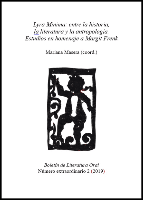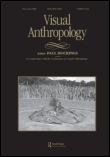
Revista de Etnografie si Folclor-Journal of Ethnography and Folklore
Scope & Guideline
Fostering Dialogue on Cultural Dynamics and Practices
Introduction
Aims and Scopes
- Ethnographic Studies:
The journal emphasizes original ethnographic research, documenting cultural practices, beliefs, and narratives from various communities, particularly focusing on underrepresented or minority groups. - Folklore Analysis:
It provides critical analyses of folklore, including oral traditions, songs, myths, and proverbs, exploring their significance within cultural identity and community resilience. - Interdisciplinary Approaches:
The journal encourages interdisciplinary methodologies, combining perspectives from anthropology, sociology, history, and literary studies to provide a comprehensive understanding of cultural phenomena. - Cultural Heritage and Preservation:
A significant focus is placed on the documentation and analysis of intangible cultural heritage, examining its role in contemporary societies and its preservation amidst globalization. - Music and Performance Studies:
The journal explores the intersections of folklore with music and performance, investigating how these elements contribute to cultural expression and community identity.
Trending and Emerging
- Digital Ethnography and Online Narratives:
Recent publications have increasingly addressed the influence of digital media on folklore, exploring how online platforms shape cultural narratives and community interactions, particularly among diaspora populations. - Food Culture and Ethnography:
There is a growing interest in the study of food culture as a lens for understanding ethnic identities and cultural practices, highlighting the significance of culinary traditions in contemporary social contexts. - Intercultural Perspectives on Sexuality and Gender:
Emerging themes reflect a focus on sexuality and gender within intercultural contexts, examining how these elements are represented in folklore and how they intersect with cultural narratives. - Environmental and Ecological Folklore:
A trend towards exploring folklore's relationship with environmental issues and ecological narratives has emerged, reflecting a broader societal concern for sustainability and cultural responses to ecological change. - Globalization and Cultural Hybridization:
The journal is increasingly publishing works that analyze the impacts of globalization on local folklore, particularly how cultural hybridization influences traditional practices and narratives.
Declining or Waning
- Traditional Costume Studies:
There has been a noticeable decline in studies focusing specifically on traditional costumes, with fewer papers exploring their historical significance or cultural functions in recent publications. - Historical Narratives in Folklore:
Research centered on historical narratives and their connection to folklore has decreased, suggesting a shift towards contemporary cultural issues and practices. - Regional Folklore Specificity:
Papers concentrating on specific regional folklore traditions, particularly those that do not engage with broader comparative or thematic frameworks, appear to be less frequent, indicating a potential move towards more global or universal themes.
Similar Journals

Milli Folklor
Advancing Knowledge in Arts and Cultural StudiesMilli Folklor, published by GELENEKSEL YAYINCILIK LTD STL, stands as a significant platform for scholarly discourse in the fields of Arts and Humanities and Cultural Studies, with an ISSN of 1300-3984 and E-ISSN 2146-8087. As a prominent Turkish journal, it has been actively contributing to the academic community since its inception in 2002, and it is set to converge its publishing journey through to 2024. With a commendable Q2 category ranking in both the Arts and Humanities (miscellaneous) and Cultural Studies categories, the journal reflects a solid standing within the academic landscape, sitting in the 40th percentile for general arts and humanities and the 34th percentile in social sciences. Milli Folklor emphasizes the exploration and preservation of folkloric traditions, cultural practices, and societal narratives—facilitating interdisciplinary research that transcends national boundaries. Although primarily a print journal, the insights shared in its pages serve as invaluable resources for researchers, professionals, and students alike who seek to deepen their understanding of cultural phenomena. The journal aims to enrich scholarly discussions while broadening readers' perspectives on the intricate tapestry of culture and society.

Boletin de Literatura Oral
Bridging Disciplines Through the Study of Oral NarrativesBoletin de Literatura Oral is an esteemed academic journal published by UNIV JAEN, SERV PUBLICACIONES, dedicated to advancing the fields of Anthropology, History, Linguistics, and Literary Theory. With its Open Access model established in 2011, the journal ensures that valuable research reaches a global audience without financial barriers. Based in Spain, at the CAMPUS LAGUNILLAS in Jaen, this publication has been recognized for its rigorous scholarship, achieving a Q4 ranking in Anthropology and notable Q3 and Q2 rankings in related disciplines as of 2023. The journal thrives on its commitment to fostering interdisciplinary dialogue, serving as a vital resource for researchers, professionals, and students keen on exploring the rich tapestry of oral literature and its implications across cultures. The journal is indexed in major databases, underscoring its relevance and accessibility in the research community.

Sibirskii Filologicheskii Zhurnal
Fostering Academic Excellence in Philological ResearchSibirskii Filologicheskii Zhurnal is a prestigious academic journal published by the Russian Academy of Sciences, Institute of Cytology and Genetics. With ISSN 1813-7083, it is dedicated to advancing research in the fields of Cultural Studies, Linguistics and Language, and Literature and Literary Theory, and has achieved notable rankings, including Q2 in Cultural Studies and Linguistics, and Q1 in Literature for 2023. The journal provides a platform for scholarly discourse, contributing valuable insights to its fields with an evolving scope that spans from 2018 to 2024. Though not an open-access journal, Sibirskii Filologicheskii Zhurnal serves as a vital resource for researchers, professionals, and students in the Russian Federation and beyond, fostering a deeper understanding of linguistic and literary phenomena. Its commitment to high-quality content makes it an essential addition to any academic's library.

Studia Ethnologica Croatica
Advancing Ethnological Insights for a Global AudienceStudia Ethnologica Croatica is a distinguished open-access journal dedicated to the fields of ethnology and cultural anthropology, published by the University of Zagreb's Faculty of Humanities and Social Sciences. Since its inception in 1989, the journal has provided a platform for scholarly discourse and critical analysis of cultural practices, social structures, and ethnographic research pertinent to Croatia and beyond. With an impressive Q2 ranking in Cultural Studies and a strengthening presence in Anthropology (Q3), the journal is essential for researchers and practitioners alike, contributing significantly to ongoing discussions within these disciplines. Recognized on Scopus with notable rankings, it represents a valuable resource for those seeking to deepen their understanding of contemporary ethnological issues. The journal operates under an open access model, ensuring that its high-quality research is freely accessible to a global audience, thereby fostering collaboration and inspiring new inquiries within the social sciences.

Lares-Quadrimestrale di Studi Demoetnoantropologici
Delving Deep into Ethnographic Studies and TraditionsLares-Quadrimestrale di Studi Demoetnoantropologici is a prominent scholarly journal dedicated to the fields of demoethnoanthropology, exploring the intersections of cultural practices, traditions, and social dynamics. Published by CASA EDITRICE LEO S OLSCHKI, this esteemed journal provides an academic platform for researchers and practitioners to disseminate original research findings and critical reviews, delving into ethnographic studies and community-based inquiries. With an ISSN of 0023-8503 and an E-ISSN of 2036-511X, Lares is recognized for its commitment to scholarly excellence and its contribution to advancing knowledge within its field. Although it currently categorizes as non-open access, the journal remains highly regarded among academics, ensuring the widespread dissemination of significant research. The journal's base in beautiful Florence, Italy, enhances its cultural richness and appeal, making it a notable reference point for scholars dedicated to the study of human cultures and social systems.

Revista Espanola de Antropologia Americana
Illuminating the Dynamics of American AnthropologyRevista Española de Antropología Americana, published by UNIV COMPLUTENSE MADRID, SERVICIO PUBLICACIONES, stands as a significant contribution to the field of anthropology, particularly focusing on American societies and cultures. Since its inception in 1970, this journal has evolved, with issues currently being published until 2024, providing a platform for original research, reviews, and scholarly discourse. Despite being a Q3 category journal in the 2023 rankings, it plays a pivotal role in disseminating knowledge and stimulating academic debate within the anthropology community. With an ISSN of 0556-6533 and an E-ISSN of 1988-2718, Revista Española de Antropología Americana strives to engage researchers, professionals, and students with insightful content that reflects the dynamic nature of cultural studies. Although it operates under traditional access models, the rich array of topics covered ensures its relevance to ongoing scholarly conversation in social sciences and anthropology. Addressing a diverse array of anthropological themes, this journal is essential for anyone looking to deepen their understanding of the cultural frameworks shaping American societies.

Slovensky Narodopis-Slovak Ethnology
Championing Open Access to Ethnological ResearchSlovensky Narodopis-Slovak Ethnology is a leading academic journal dedicated to the exploration of ethnology and cultural studies, published by the Slovak Academy of Sciences at the Institute of Ethnology. With an Open Access policy since 2013, it strives to make high-quality research readily accessible to a global audience, enhancing the dialogue around Slovak cultural heritage and broader anthropological topics. The journal holds a notable position in the field, currently ranked Q2 in anthropology for 2023, indicating its substantial contribution to the discipline. It is indexed in Scopus, with a current rank of 245 out of 502 in the Social Sciences category, reflecting its value within the academic community. Researchers and students alike can look forward to a rich array of original research articles, reviews, and essays that not only delve into Slovak ethnology but also engage with international perspectives, thereby enriching the understanding of cultural dynamics and practices.

Etnoloska Tribina
Diving Deep into Cultural Phenomena and Anthropological InsightsEtnoloska Tribina, published by the Croatian Ethnological Society, is a premier open-access journal dedicated to the fields of Anthropology and Cultural Studies, serving as a vital platform for scholars and practitioners since its inception in 1970. With an impressive impact factor reflected in its current Q3 rankings in both Anthropology and Cultural Studies, the journal continues to foster scholarly discourse and innovative research within these disciplines. As part of the Scopus database, Etnoloska Tribina ranks in the top 67th percentile for Cultural Studies, providing readers with cutting-edge explorations and critical analyses that contribute to the understanding of cultural phenomena. The journal's commitment to open access empowers a global audience in Croatia and beyond, facilitating the exchange of ideas and knowledge across borders. Researchers, professionals, and students alike can benefit from the rich and diverse array of articles that illuminate cultural identities and anthropological inquiry from 2011 to the present.

Journal of Urban Ethnology
Bridging Disciplines to Decode Urban RealitiesJournal of Urban Ethnology, published by the Polish Academy of Sciences, Institute of Archaeology & Ethnology, is a premier scholarly journal focused on the multifaceted dimensions of urban life through an ethnographic lens. With a commitment to advancing the field of urban studies, this journal welcomes original research articles, case studies, and theoretical discussions that explore the rich tapestry of urban communities, cultural practices, and social dynamics. The journal plays a crucial role in fostering interdisciplinary dialogue among anthropologists, sociologists, urban planners, and cultural researchers, making it an invaluable resource for professionals, students, and scholars alike. While it currently operates under a traditional access model, the journal strives to contribute to an understanding of contemporary urban challenges and innovations, supporting the quest for sustainable and equitable urban futures. The ISSN for the journal is 1429-0618, ensuring its recognition in global academic databases.

Visual Anthropology
Innovating Anthropological Inquiry with Visual MediaVisual Anthropology is a distinguished journal published by Routledge Journals, Taylor & Francis Ltd in the United Kingdom. With an ISSN of 0894-9468 and E-ISSN 1545-5920, this journal focuses on the intersection of visual media and anthropological research, exploring the ways in which visual representations influence cultural practices and perceptions. Since its inception in 1987, Visual Anthropology has contributed significantly to the fields of Anthropology and Cultural Studies, earning a Q2 rank in both categories as of 2023. With a solid impact factor and strategic indexing, the journal maintains a vital place for scholars seeking to understand the visual dimensions of human behavior and societal structures. Although it operates under a traditional subscription model, its rigorous peer-review process ensures the dissemination of high-quality research. The journal invites researchers, professionals, and students alike to engage with cutting-edge studies that bridge visual culture and anthropological inquiry.